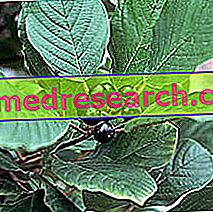Generality
Allergic cough is a particular form of cough that occurs in patients with allergic airway diseases .

More specifically, allergic cough is a symptom of these diseases.
Difficult to eliminate and, sometimes, even to diagnose, this symptom can cause considerable discomfort to patients who suffer from it. Your treatment cannot do without the treatment of the allergic disease that caused it and always requires medical attention.
What is that
What is Allergic Cough and how is it manifested?
Allergic cough is a symptom induced by various diseases of an allergic nature involving the respiratory tract. It can occur either in the form of a very annoying persistent dry cough, or in the form of a fat cough characterized, therefore, by the presence of phlegm.
The occurrence of one type of cough or the other depends substantially on the disease that triggered the allergic cough.
Please note
The allergic cough should not be confused with the cough caused by other diseases that involve the respiratory system, but the nature of which is not allergic. A classic example of such diseases is COPD (Chronic Obstructive Pulmonary Disease).
Features
What are the Characteristics of Allergic Cough?
The allergic cough can occur both in the form of a dry cough and in the form of a cough to fat, depending on the disease that caused it. Sometimes it could be mistaken for a symptom due to common colds. However, it has some characteristics that distinguish it from other types of cough:
- Resists the common symptomatic treatments used to calm the cough;
- It can be present all year round, including warm months;
- It can last for long periods of time;
- Usually, it is not accompanied by fever and muscle pain; symptoms that, instead, are typical of colds.
Causes
What are the Causes of Allergic Cough?
As mentioned, allergic cough is a symptom triggered by allergic diseases involving the airways.
Due to the aforementioned diseases, following contact (inhalation) with various types of allergens (eg pollens, mites, fur and dandruff from animals, etc.), the immune system reacts excessively and uncontrollably, causing an allergic reaction which manifests itself with more or less severe symptoms, including coughing.
Among the main diseases that can lead to the onset of allergic cough, we find:
- Allergic rhinitis : it is a very common disease in our country and can be both seasonal (acute) and chronic. It can give rise to a long series of annoying symptoms, among which we also find a persistent and irritative cough .
- Allergic asthma : it is the most common allergic diseases of the lower airways. Among the various symptoms induced by it there is also the appearance of a persistent allergic cough which, generally, begins as dry and then turns into fat due to excessive production of mucus.
- Allergic laryngitis : allergic laryngitis occurs when the allergic irritative stimulus affects the larynx. It is a particular disorder that mainly affects children; it can give rise to a persistent dry cough which tends to occur particularly at night.
Did you know that ...
Over time, it is not unusual for allergic rhinitis to spontaneously evolve into allergic asthma. Fortunately, this does not necessarily occur in all patients. However, in patients suffering from allergic rhinitis characterized by a particularly intense and insistent cough, it is usually recommended to perform specific tests (such as spirometry), in the hope of early detecting a possible pre-clinical status of asthma.
Associated symptoms
What symptoms can occur in the association with allergic cough?
In the vast majority of cases (but not all), the allergic cough is associated with other symptoms that can provide indications on which disease affects the patient.
Allergic rhinitis
When allergic cough is caused by rhinitis, it usually occurs in association with symptoms, such as:
- Burning and redness of the eyes;
- Tearing;
- photophobia;
- runny nose;
- Closed nose;
- Stranuti.
Allergic asthma
If the cause of the allergic cough resides in asthma, the associated symptoms may be:
- Dyspnoea;
- Wheezing breath;
- Sensation of chest constriction;
- Shortness of breath;
- Ronchi;
- Sense of suffocation.
Allergic Laryngitis
When the allergic cough is connected to the presence of laryngitis, it can manifest itself in association with symptoms such as dysphonia and inspiratory dyspnea.
Diagnosis
How is allergic cough diagnosed?
Making a certain diagnosis of allergic cough is not always easy, since, sometimes, it can manifest itself as the only symptom, or possibly associated with other manifestations that do not allow the immediate identification of a possible allergic pathology. In truth, this is a rather rare event, as patients suffering from allergic airway diseases rarely experience cough as the only symptom.
However, when this occurs, the doctor must be able to discriminate between an allergic cough and a cough caused by other causes, such as, for example, infectious diseases (viral, bacterial, fungal), taking medications for which cough is a known side effect or other diseases that can give rise to this type of symptom (including, for example, gastroesophageal reflux disease which gives rise to the so-called reflux cough).
However, in most cases, allergic cough manifests itself in association with other typical symptoms of allergic airway diseases (see previous chapter), making the diagnosis certainly easier to perform.
In case of doubt, the doctor can still resort to more in-depth analyzes and tests in order to establish exactly what disease afflicts the patient (blood test, spirometry, etc.).
Treatments and Treatments
How to treat allergic cough?
Allergic cough does not respond to classic symptomatic treatments to calm the cough, dry or oily. In fact, the treatment of this type of cough is closely related to the treatment of the main cause that triggered it, hence the basic allergic disease. To treat diseases of this type, it is generally necessary to resort to specific drugs, such as:
- Antihistamines : are drugs that block histamine receptors, hindering their activity. In fact, this neurotransmitter is involved in inflammatory processes and bronchoconstriction typical of various allergic diseases. Examples of antihistamine active ingredients used in this area are cetirizine, desloratadine and fexofenadine.
- Bronchodilators : bronchodilator drugs - as can be inferred from their own name - are drugs that can counteract the bronchoconstriction that can occur during an allergic attack. They are used especially in the treatment of asthma, but not only. These drugs are divided into:
- Β2-adrenergic receptor agonists, including salbutamol, salmeterol and formoterol.
- Antimuscarinics, such as hypratropium bromide, used in the treatment of asthma and rhinorrhea induced by allergic rhinitis (not surprisingly, retronasal drip is one of the factors that can favor the onset of allergic cough).
- Methylxanthines such as aminophylline, used in the treatment of asthma.
Given the particular site of action of these drugs - with the exception of the methylxanthines usually administered orally, parenterally or rectally - the other bronchodilator drugs are administered by inhalation .
- Corticosteroids : steroidal anti-inflammatory drugs are able to reduce the inflammatory component of allergic diseases, reduce the hyper-reactivity of the airways and control the production of mucus that can occur in some allergic diseases. Corticosteroids are used especially in cases of asthma and allergic rhinitis. A classic example of an active ingredient used in this area is beclomethasone (administered by inhalation).
Please note
The pharmacological treatment of allergic diseases must be prescribed by the doctor. After identifying the disease that afflicts the patient, it will assess which therapeutic strategy is best to undertake and which are the most suitable drugs to treat the disease in question. For example, asthma is preferentially treated with bronchodilator drugs and corticosteroids; while seasonal allergies usually require the use of antihistamines.
However, under no circumstances can you do the DIY treatment, but medical attention is always required.
Useful Tips
Useful Tips to Prevent Allergic Cough
Allergic cough can be prevented by avoiding those factors that give rise to or promote the onset of allergic attack. Therefore, here are some useful tips. In this regard, we recall that the adoption of correct lifestyle habits is a real support to the pharmacological therapy of allergic airway diseases.
- Avoid - as far as possible - contact with the agent responsible for the allergy (allergen).
- Avoid the irritating substances that could trigger the allergic reaction. For example, cigarette smoking, smog, etc.
- Keep the home environment well dry and ventilated, avoiding sources of moisture that could favor the appearance of mold (potential allergens). If necessary, the use of dehumidifiers could be useful.
- In case of pollen allergy, wash and remove used clothes outdoors during periods when there are high concentrations of these substances in the air.
- If necessary, install appropriate air purifiers in the home.
- Follow all the treatments and pharmacological therapies prescribed by your doctor and do not interrupt them earlier than expected without first consulting them.
If the allergic cough persists despite drug therapy and despite the adoption of correct habits, it is necessary to contact your doctor again.



